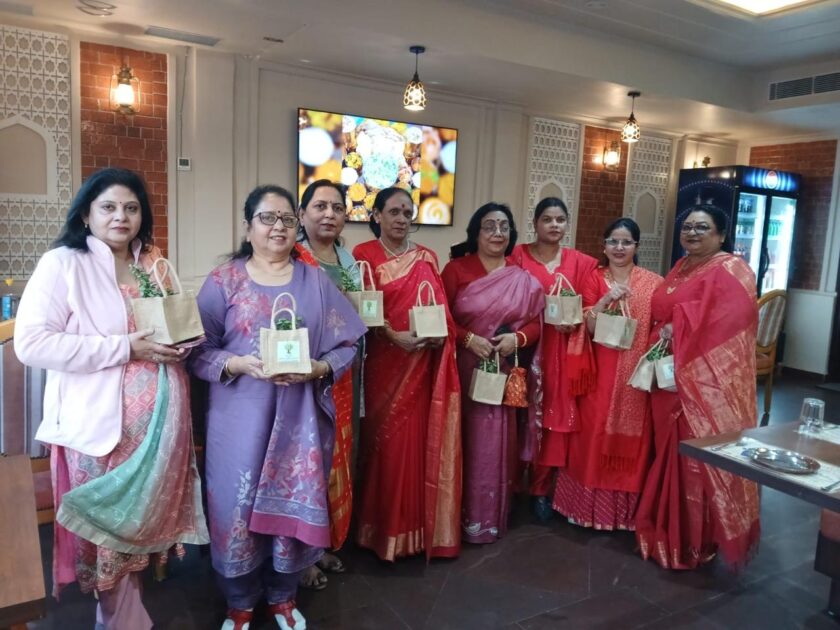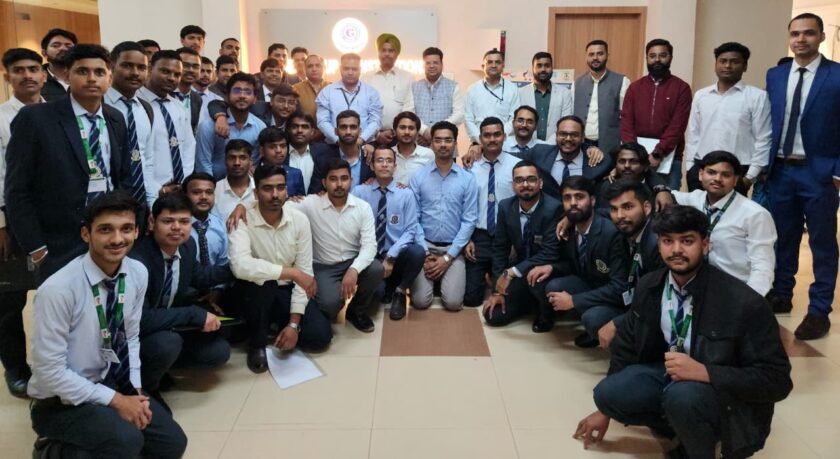“Delhi is not only the lifeline of modern India but also a living example of unity in diversity,” — Prof. Raj Kumar Mittal
Lucknow: Babasaheb Bhimrao Ambedkar University, Lucknow, celebrated ‘Delhi Statehood Day’ on November 1 with great enthusiasm and a series of diverse programs. The event was presided over by the Hon’ble Vice-Chancellor, Prof. Raj Kumar Mittal. The Chief Guest of the program was Vishal Singh (IAS), Director of Information, Department of Information and Public Relations, Government of Uttar Pradesh. The Guest of Honour included Prof. Amarpal Singh, Vice-Chancellor, Dr. Ram Manohar Lohia National Law University, and Dr. Dinesh Singh, Director, ICAR–Indian Institute of Sugarcane Research (IISR), Lucknow.
The program commenced with the traditional lighting of the ceremonial lamp and floral tribute to Dr. B.R. Ambedkar’s statue. Following the university anthem, the organizing committee presented mementos, shawls, and bouquets to the guests as a token of gratitude. Dr. Lata Bajpai Singh conducted the stage proceedings, welcomed everyone present, and briefed the gathering about the objectives and outline of the program.
Hon’ble Vice-Chancellor Prof. Raj Kumar Mittal congratulated the organizing committee for the successful and meaningful event.
He remarked that India is a nation unique in its diversity—whether in the fields of work, education, or culture—its experiences are immensely rich and multidimensional. He emphasized that the true strength of any democratic structure lies in how deeply its citizens understand and connect with each other. He stated that promoting education and research, encouraging knowledge exchange, and fostering cooperation are the cornerstones of a strong democracy. Speaking about Delhi, Prof. Mittal said that the city stands as India’s economic, administrative, and cultural hub, symbolizing progress and unity. Over the past 25 years, Delhi has witnessed remarkable growth in education, healthcare, culture, art, and cuisine, enhancing India’s global identity. He described Delhi as ‘the lifeline of modern India and a living embodiment of unity in diversity,’ a quality that strengthens harmony and enriches the democratic process.
The Chief Guest, Vishal Singh (IAS), in his address, stated that it is essential for all citizens to understand India’s federal structure, as it is the greatest strength of the nation’s democracy. Celebrating Delhi Statehood Day in Uttar Pradesh, he said, is not just about one state but about unity, collaboration, and mutual respect among all states and cultures. The day reminds us that India’s strength lies in its diversity. He urged students to deeply study the ideas and ideals of Dr. B.R. Ambedkar, who envisioned an India based on equality, fraternity, and justice. Mr. Singh emphasized the importance of mutual dialogue and cooperation among people from different linguistic and cultural backgrounds to strengthen national unity and social harmony. He also reminded that citizens’ responsibilities extend beyond their own state—to the entire nation’s development and unity.

Guest of honour Prof. Amarpal Singh, Vice-Chancellor of Dr. Ram Manohar Lohia National Law University, highlighted that understanding the cultures, personalities, and value systems of people from different regions enriches one’s own perspective and promotes intellectual growth. He said that unity in diversity is India’s greatest identity—where numerous languages, traditions, and cultures coexist with one shared goal: national progress and unity. Delhi, he added, is not only the political capital of India but also the center of the nation’s cultural, social, and intellectual cohesion. He called upon everyone to uphold the spirit of harmony, cooperation, and cultural exchange to preserve this extraordinary unity.
Dr. Dinesh Singh, Director of Indian Institute of Sugarcane Research, Lucknow, shared insights into the institute’s research activities, objectives, and ongoing projects aimed at enhancing the quality and productivity of sugarcane in India. He remarked that Delhi is the heartbeat of the nation, from where most of the administrative and commercial activities originate. He added that Delhi Statehood Day reminds us that the capital is not merely a political center but also the source of inspiration for the country’s economic, scientific, and social progress. Institutions like IISR play a crucial role in nation-building and sustainable development.
On this occasion, the University Media Centre presented a documentary titled ‘Delhi – The Heartbeat of the Nation.’ The dignitaries also released a compilation titled ‘Delhi – Ek Yatra’ (Delhi: A Journey). Winners of various competitions were felicitated with certificates of appreciation, and a poets’ symposium (Kavi Sammelan) was organized. The kavi Sammelan featured Jagdish Mittal, National President of Rashtriya Kavi Sangam, New Delhi, as the chief guest. Eminent poets such as Kamlesh Maurya Mridu (Sitapur), Dr. Ashok Batra (Gurugram), Shivkumar Vyas (Barabanki), Atal Narayan (Prayagraj), Ms. Soni Mishra (Lucknow), Utkarsh Uttam (Raebareli), and Mr. Mrityunjay Shukla (Hardoi) captivated the audience with their poetic renditions on various themes. All participating poets were honored with mementos and shawls. The university students also showcased various cultural performances, while young student entrepreneurs set up creative stalls exhibiting their innovative products. The event was attended by Prof. S. Victor Babu,Dean of Academic Affairs, Prof. Ram Chandra,Proctor, Prof. Narendra Kumar, DSW, along with deans, heads of departments, faculty members, non-teaching staff, and students.









